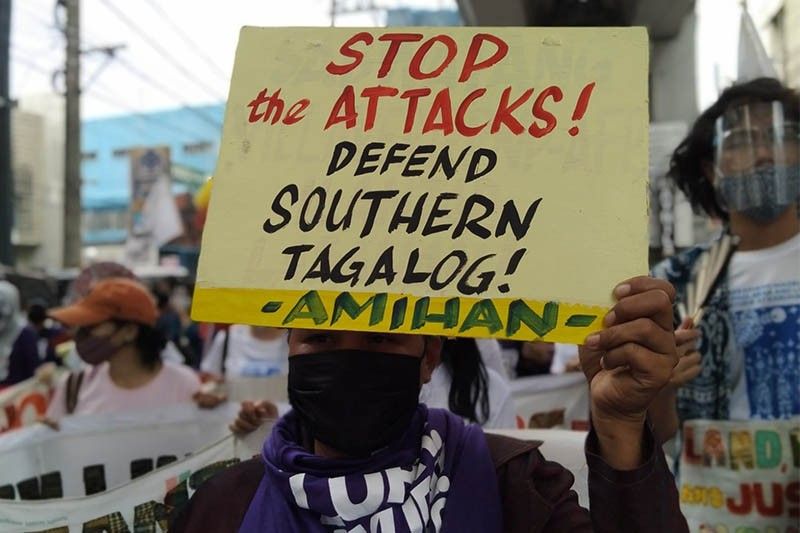DOJ-led task force on extrajudicial killings to investigate 'Bloody Sunday' raids

MANILA, Philippines — A Department of Justice-led task force investigating politically-motivated killings will look into the deaths of at least five activists in a series of violent police raids in the Calabarzon region on Sunday.
The police conducted simultaneous raids early Sunday moring to serve search warrants on activists in Batangas. Cavite, Rizal and Laguna. The police said teams killed activists who had fired on them first, a common narrative in police operations, including those in the "war on drugs."
Of those killed, rights groups have so far identified five, although reports from Sunday said nine people were killed.
The fatalities were identified as activist leader Emmanuel Asuncion of BAYAN-Cavite, Ugnayan ng Mamamayan Lavan sa Pagwawasak ng Kalikasan at Kalupaan (UMALPAS KA) members Chai and Ariel Evangelista, and urban poor organization SIKKAD members Makmak Bacasno and Michael Dasigao.
Justice Secretary Menardo Guevarra told reporters on Monday that if activists involved in certain advocacies such as trade unionism or peasant associations were killed, the incidents fall within the jurisdiction of the Administrative Order 35 Task Force, the body that looks into extrajudicial killings.
A meeting is set in the third or fourth week of March, and the task force may also “address this growing number” of killings, Guevarra added.
AO 35 created the Inter-agency Committee on Extra-legal Killings, Enforced Disappearance, Torture and Other Grave Violations of the Right to Life, Liberty and Security of Persons, which is chaired by the justice secretary.
RELATED: Citing past probes, Karapatan doubts task force investigation into Echanis killing
The administrative order was issued in 2012 to address allegations that state and non-state actors have been "silencing, through violence and intimidation, legitimate dissent and opposition raised by members of the civil society, cause-oriented groups, political movements, people’s and non-government organizations, and by ordinary citizens."
Rep. Ferdinand Gaite (Bayan Muna), in an interview with ANC, also demanded for a full investigation into the incident. “There must be an investigation from the [Philippine National Police] itself to account for what actually happened,” the lawmaker said.
Guevarra said he hopes for cooperation in the investigation.
"You know, the task of the AO 35 group has been made difficult by the absence or the reluctance of witnesses to testify. Others have little trust in the task force. That’s why we need to work together," he said.
AO 35 task force not limited to police information
Rights groups have slammed the “Bloody Sunday” raids as a “Tokhang-style crackdown,” a reference to the anti-narcotics campaign that has resulted in more than 6,000 acknowledged deaths.
Gaite said: “There’s been this unprecedented killings previously of supposed drug users or pushers. Now the guns are levelled against activists and this was very evident in what happened last Sunday.”
Guevarra earlier in the year flagged police officers who did not follow protocols in deadly “drug war” operations in a report to the United Nations Human Rights Council, and the justice secretary did not hide his disappointment with the latest incident of killings.
“I was really hoping that with the statement I made before the UN, our law enforcers would be more careful in their operations but these things continue to happen so we really need to sit down with PNP with the [Philippine Drug Eenforcement Agency] with other law enforcement to make sure that this… could be avoided. We could do something about it,” he added.
READ: PNP failed to follow protocols in many drug operations, Guevarra tells UN rights body
The killings happened as police were implementing search warrants for illegal firearms and explosives. The firearms and explosives allegations are the same narrative that, rights lawyers noted, led to the arrests of many activists in the past.
Like with Tokhang operations, authorities are asserting the legitimacy of the operations. Lt. Gen. Antonio Parlade, Southern Luzon military commander, was quoted in a Reuters report as saying that the raids were “legitimate law enforcement operations.”
Parlade, known labeling activists and members of the media of being communist rebels and supporters, added: “As usual these groups are so quick in assuming that the subjects were activists and that they were killed. If (the) motive was to kill them they should all be dead but there were those who did not resist arrest so they were collared.”
But Guevarra said that even if the police believe that those killed were members of the New People’s Army, the AO 35 task force is not “bound by the characterization given by the police.”
“We shall consider other available information,” Guevarra added.
The DOJ chief however refused to conclude that the deaths are connected to President Rodrigo Duterte’s speech last Friday telling law enforcers to “kill all” communists.
“The president has always been vocal about the fight against these communist terrorist groups, so that has been there a long time ago so I cannot really say that due to what the president said two days ago, there have been additional incidents like that because that has been the president’s policy ever since,” he added.
Renewed call for Supreme Court review on how warrants are issued
Rep. France Castro (ACT Teachers Party-list), in a separate statement, urged the Supreme Court to review its rule allowing executive judges in Quezon City and Manila to issue search warrants that may be implemented nationwide.
She also urged the SC to look into “the seeming complicity of several judges with human rights violations by their issuance of search warrants in violations of the Rules of Court.”
Several rights groups have, in the past, urged the SC to look into courts they alleged to be “factory of warrants.” In particular, they cited in their SC petitions Quezon City Judge Cecilyn Burgos-Villavert.
The QC judge issued search warrants implemented in Negros and Manila in 2019 that led to arrest of dozens of activities. She also issued the warrants that led to the arrest of seven activists on Dec. 10, 2020.
RELATED: Amid calls for review, judges urged to be prudent in issuing search warrants
The search warrants in Sunday's raids came from courts in Manila: From Regional Trial Court Branch 4 First Vice Executive Judge Jose Lorenzo Dela Rosa and Branch 174 Presiding Judge Jason Zapata.
The SC has yet to respond on whether it will conduct an investigation into the circumstances surrounding the issuance of warrants.
A Mandaluyong court ordered the release last week of Manila Today editor Lady Ann Salem and labor organizer Rodrigo Esparago whom police had accused of possession of firearms and explosives a month after complaints against them were dismissed.
The court found irregularities in the issuance as well as the implementation of search warrants against the two.
"Details which touch on the existence of the subject firearms, ammunition and explosives and possession by accused of these items cannot be regarded as minor or trivial. They are the very elements of the crimes for which they are being charged," the court said, pointing out inconsistencies in witness statements.
- Latest
- Trending






























